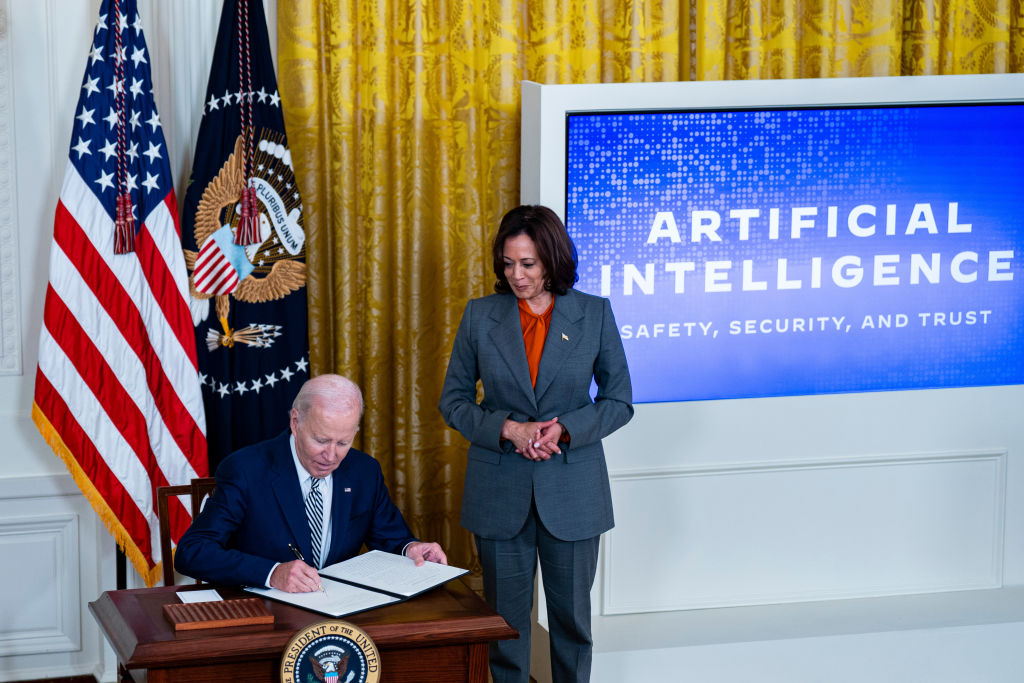On June 8, Republicans adopted a new party platform ahead of a possible second term for former President Donald Trump. Buried among the updated policy positions on abortion, immigration, and crime, the document contains a provision that has some artificial intelligence experts worried: it vows to scrap President Joe Biden’s executive order on AI.
[time-brightcove not-tgx=”true”]
“We will repeal Joe Biden’s dangerous Executive Order that hinders AI Innovation, and imposes Radical Leftwing ideas on the development of this technology,” the platform reads.
Biden’s executive order on AI, signed last October, sought to tackle threats the new technology could pose to civil rights, privacy, and national security, while promoting innovation and competition and the use of AI for public services. It requires developers of the most powerful AI systems to share their safety test results with the U.S. government and calls on federal agencies to develop guidelines for the responsible use of AI domains such as criminal justice and federal benefits programs.
Read More: Why Biden’s AI Executive Order Only Goes So Far
Carl Szabo, vice president of industry group NetChoice, which counts Google, Meta, and Amazon among its members, welcomes the possibility of the executive order’s repeal, saying, “It would be good for Americans and innovators.”
“Rather than enforcing existing rules that can be applied to AI tech, Biden’s Executive Order merely forces bureaucrats to create new, complex burdens on small businesses and innovators trying to enter the marketplace. Over-regulating like this risks derailing AI’s incredible potential for progress and ceding America’s technological edge to competitors like China,” said Szabo in a statement.
However, recent polling shared exclusively with TIME indicates that Americans on both sides of the political aisle are skeptical that the U.S. should avoid regulating AI in an effort to outcompete China. According to the poll conducted in late June by the AI Policy Institute (AIPI), 75% of Democrats and 75% of Republicans believe that “taking a careful controlled approach” to AI is preferable to “moving forward on AI as fast as possible to be the first country to get extremely powerful AI.”
Dan Hendrycks, director of the Center for Safe AI, says, “AI safety and risks to national security are bipartisan issues. Poll after poll shows Democrats and Republicans want AI safety legislation.”
Read more: U.S. Voters Value Safe AI Development Over Racing Against China, Poll Shows
The proposal to remove the guardrails put in place by Biden’s executive order runs counter to the public’s broad support for a measured approach to AI, and it has prompted concern among experts. Amba Kak, co-executive director of the AI Now Institute and former senior advisor on AI at the Federal Trade Commission, says Biden’s order was “one of the biggest achievements in the last decade in AI policy,” and that scrapping the order would “feel like going back to ground zero.” Kak says that Trump’s pledge to support AI development rooted in “human flourishing” is a subtle but pernicious departure from more established frameworks like human rights and civil liberties.
Ami Fields-Meyer, a former White House senior policy advisor on AI who worked on Biden’s executive order, says, “I think the Trump message on AI is, ‘You’re on your own,’” referring to how repealing the executive order would end provisions aimed at protecting people from bias or unfair decision-making from AI.
TechNet and a number of think tanks and tech lobbyists have railed against the executive order since its introduction, arguing it could stifle innovation. In December, venture capitalist and prominent AI investor Ben Horowitz criticized efforts to regulate “math, FLOPs and R&D,” alluding to the compute thresholds set by Biden’s executive order. Horowitz said his firm would “support like-minded candidates and oppose candidates who aim to kill America’s advanced technological future.”
While Trump has previously accused tech companies like Google, Amazon, and Twitter of working against him, in June, speaking on Logan Paul’s podcast, Trump said that the “tech guys” in California gave him $12 million for his campaign. “They gave me a lot of money. They’ve never been into doing that,” Trump said.
The Trump campaign did not respond to a request for comment.
Even if Trump is re-elected and does repeal Biden’s executive order, some changes wouldn’t be felt right away. Most of the leading AI companies agreed to voluntarily share safety testing information with governments at an international summit on AI in Seoul last May, meaning that removing the requirements to share information under the executive order may not have an immediate effect on national security. But Field-Meyer says, “If the Trump campaign believes that the rigorous national security safeguards proposed in the executive order are radical liberal ideas, that should be concerning to every American.”
Field-Meyer says the back and forth over the executive order underscores the importance of passing federal legislation on AI, which “would bring a lot more stability to AI policy.” There are currently over 80 bills relating to AI in Congress, but it seems unlikely any of them will become law in the near future.
Sandra Wachter, a professor of technology regulation at the Oxford Internet Institute says Biden’s executive order was “a seminal step towards ensuring ethical AI and is very much on par with global developments in the UK, the EU, Canada, South Korea, Japan, Singapore and the rest of the world.” She says she worries it will be repealed before it has had a chance to have a lasting impact. “It would be a very big loss and a big missed opportunity if the framework was to be scrapped and AI governance to be reduced to a partisan issue,” she says. “This is not a political problem, this is a human problem—and a global one at that.”

